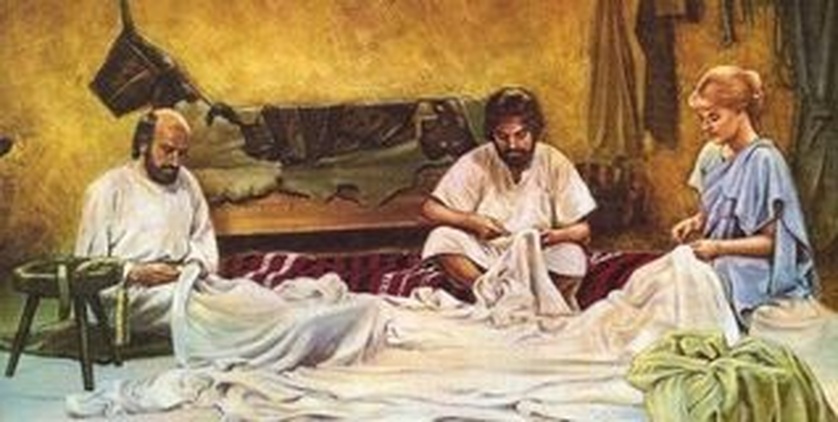[Greek] τέχνη (technē) [Latin] ars: art, craft, trade, skill, occupation, technique; Act.17:29, Act.18:3, Rev.18:22

St. Paul works with his fellow tent-makers Aquila and Priscilla
Background Information:
Secular culture: This term illustrates the creative process of making something appear and the bringing forth of something. Expertise, knowledge, and skills become practically applied in various genres (politics, literature, rhetoric, philosophy, and the arts). The value of techne is the end product. Plato’s Republic provides the basis for the philosophers’ craft of ruling in the city. Aristotle uses health as an example of an end that is produced from the techne (skill) of medicine.
Old Testament: Interestingly, the Old Testament culture really did not have an applicable term pertaining to the fine arts. It was only until the 20th century that such a Hebrew term was developed. Perhaps, the traditional Old Testament cultural values did not have the need for such a term. It seems that the Aramaic term umanut, meaning craftsmanship, provides the closest meaning to the Greek word techne. This fragrant powder, expertly prepared, is to be salted and so kept pure and sacred (Ex. 30:35). The various artisans who were doing the work made the tabernacle with its ten sheets woven of fine linen (Ex.36:8). You have available workers, stonecutters, masons, carpenters, and experts in every craft (2 Chr.22:15). They continue to sin, making for themselves molten images, silver idols according to their skill, all of them work of artisans (Hos.13:2).
New Testament: Essentially, this term refers to a craft, skill, or trade. In Athens, Paul appeals to the religiosity of Greeks, who worship various gods, including an unknown God. Paul mentions that God’s divinity cannot be fashioned by gold, silver, stone, or human art and imagination. Paul, a tentmaker by profession, supports his ministry with his craft. In many languages there is no special term for craft.
Scripture:
“Since therefore we are the offspring of God, we ought not to think that the divinity is like an image fashioned from gold, silver, or stone or human art and imagination.” Act.17:29
Paul mentions that God cannot be limited or defined by images created by artisans.
“And because he practiced the same trade, stayed with them and worked, for they were tentmakers by trade.” Act.18:3
Paul, a tentmaker, supported his ministry with his craft. Paul also associated with Aquila and Priscilla, whom were also tentmakers.
Conclusion:
Technique, technical, art, artisan, artistic, artistry
I would say that the ancient Greco-Roman secular culture has made a profoundly great contribution to developing the skills (talents) in various genres such as philosophy, rhetoric, literature, sciences, and the arts. This is easily understood, considering all of the geniuses from ages past.
It is probably not surprising that the simple, agrarian Old Testament culture would have no need for a term for the fine arts. This society would be more concerned with trades, craftsmanship, and apprenticeship. Even in the New Testament, it was important that Jesus learned carpentry from His stepfather Joseph. Even Paul supported his ministry through his trade of tent making.
Art is a technique. It is through this that we have encountered so many masterpieces by great artists in painting, sculpture, literature, and in other fields.
